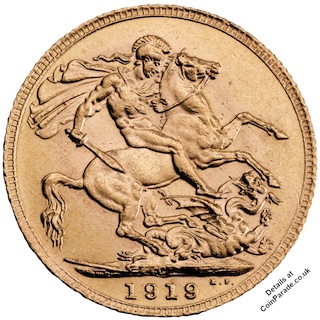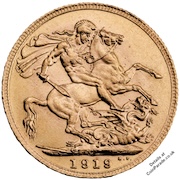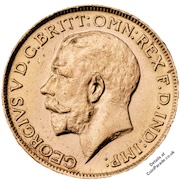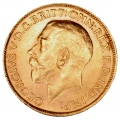
 The 1919 Gold Sovereign Canada - George V
The 1919 Gold Sovereign Canada - George VThe 1919C Gold Sovereign of King George V. A small 'C' just above the date indicates the sovereign was produced at the Ottawa Mint, Canada. Mintage was low at 135,957. SCBC: 3997.
The Reverse depicts Benedetto Pistrucci’s famous portrayal of St George slaying the dragon on the reverse of the coin. The artist's initials B.P. on the right of the date.
The edge is milled.
 The Obverse shows a portrait of King George V (on the legend Latin spelling as GEORGIVS V). The obverse was designed by Bertram Mackennal (initials B.M. on truncation of neck).
The Obverse shows a portrait of King George V (on the legend Latin spelling as GEORGIVS V). The obverse was designed by Bertram Mackennal (initials B.M. on truncation of neck).Coin shown graded as EF.
Image credit: The Royal Mint
Mintage: 135,957 (may include coins in sets)
Minted at The Canadian Mint
Below are some coins currently being offered on eBay. As an eBay Partner, We may be compensated if you make a purchase.
 George V was King of the United Kingdom and the British Dominions, and Emperor of India, from 6 May 1910 until his death in 1936 and was King during World War 1. George was the second son of Albert Edward, Prince of Wales (later King Edward VII), and grandson of Queen Victoria. After his death he was succeeded by his eldest son, Edward VIII.
George V was King of the United Kingdom and the British Dominions, and Emperor of India, from 6 May 1910 until his death in 1936 and was King during World War 1. George was the second son of Albert Edward, Prince of Wales (later King Edward VII), and grandson of Queen Victoria. After his death he was succeeded by his eldest son, Edward VIII. In 1919-20, the Silver price rose dramatically so .925 silver coins began to made in 0.500 siver. Gold Sovereigns were produced in large quantities early in George's reign - over 30 million in 1911 and again in 1912, although there was no bullion sovereigns issued 1918-1924 (Commonwealth mints did continue mintage).
Besides being minted in Britain, Sovereigns have been made in Australia (Melbourne, Sydney, Perth), India (then Bombay, now Mumbai), Canada (Ottawa) and South Africa (Pretoria) although these regional mints have not made sovereigns since 1932 (although India has produced some recently in a private mint partnership with the Royal Mint). The non-British coins carry a small mintmark ('S','M','P','I','C' or 'SA') just above the date. This 1919 Gold Sovereign Canada - George V was minted at The Canadian Mint.
The Obverse is the Monarch's head (George V) and the Reverse is most often St George and the Dragon, although other backs have been used and are of interest to collectors. The Reverse often gives the Sovs a new term, like "ShieldBacks".
Specifications for the Gold Sovereign
- Weight: 7.9881g
- Diameter: 22.05 mm
- Thickness: 1.52 mm
- Purity: 22 carat = 91.67% (11/12ths gold, 1/12th copper. Adding copper makes the coin more scratch and dent resistant)
- Gold Content: 113 grains = 7.3224 g = 0.2354 troy ounce
- Face value: £1 = 20 shillings
- Monarch: George V
History
Up until 1604 there was a coin called the English gold sovereign and in 1816 when there was the "Great Recoinage" the name was revived. At that time standard gold (22 carat) was valued at £46 14s 6d per troy pound; this meant a £1 coin needed to weigh 123.2744783 grains or 7.988030269 g. The weight is still the same today.
As a historical note: to maintain the Gold Standard, in 1816 the value of silver was set at 66 shillings for one troy pound and silver coins were only legal for denominations up to £2.
The first sovereigns carried the head of King George III and the famous George and the Dragon design by Benedetto Pistrucci (29 May 1783 – 16 September 1855), an Italian engraver who became chief medallist at the Royal Mint.
With high value coins such as the 1919 Gold Sovereign Canada - George V, collectors and bullion investors often worry about forgeries but actually gold coins are very difficult to forge due to gold's unique properties of density and colour. Gold is extremely dense and to use another metal and gold-plate it would result in a coin that is under-weight, over-diameter or half as thick, something that would be spotted very easily. More difficult to spot would be a bullion coin melted down and re-cast as a highly collectable date, but an expert can usually tell these too. You should always use reputable dealers.
The Royal Canadian Mint is renowned for its innovation in minting coins.








